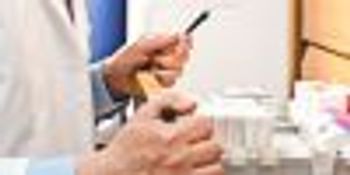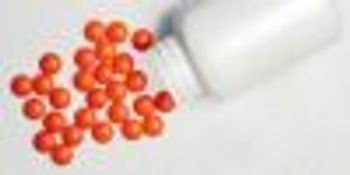
In a study of their experiences in a transition of care program, hospital pharmacists had a number of recommendations for improvement.

In a study of their experiences in a transition of care program, hospital pharmacists had a number of recommendations for improvement.

Flu shots are in short supply as the 2012-2013 season ramps up a month earlier than usual, but there are signs that this year's outbreak may peak early as well.

From a grassroots petition launched by a PharmD candidate to a concerted effort among CEOs of national pharmacy associations, the push is on to win health care provider status for pharmacists.

Based on their findings that patients are more likely to stop taking antiepileptic drugs when pills change color upon refill, researchers argue that the FDA should require generic pills to mimic the appearance of their brand-name equivalents.

An analysis of published and unpublished trials of Z drugs finds that almost half their ability to help users fall asleep is due to the placebo effect.

The bill to avert the "fiscal cliff" passed by Congress will affect the majority of Americans, but several provisions will impact retail pharmacies in particular.

Representatives of the NABP and the ASHP discussed the crisis surrounding compounding pharmacy, including liability for purchasers of medication from compounders, a plan to inspect more pharmacies, and the possibility of new regulation of compounding.

Despite monitoring and recording of inpatient acetaminophen dosing, the results of a study find that 1 in 25 patients admitted to a pair of hospitals received a supratherapeutic dose, putting them at risk of severe adverse effects.

Our review of the year's biggest stories in pharmacy-from the Express Scripts-Medco merger to the fungal meningitis outbreak to the disappearance of Primatene Mist from pharmacy shelves.

Researchers did not find a single instance of true aspirin resistance in a study including 400 participants, and suggest that slow absorption of enteric-coated aspirin may lead to the appearance of resistance.

Far more patients claimed to have adhered to their antibiotic prescriptions than actually did, according to the results of a study that used an electronic system to record when pill bottles were opened.

In his keynote address at the ASHP Midyear Clinical Meeting and Exhibition, the former president discussed how to improve health care and the role that pharmacists can play in bringing about this improvement.

Patients receiving medication for attention-deficit/hyperactivity disorder appear to be significantly less likely to commit crimes, according to the results of a study.

Compounds in grapefruit can interact with a growing number of oral medications to produce serious side effects, according to a review of previous studies.

Even after accounting for confounding variables such as disease severity and length of stay, pediatric inpatients with chronic conditions are significantly more likely to experience medical errors, according to the results of a study.

In the program, called WellTransitions, pharmacists work with hospital staff to oversee the medication regimens of discharged patients.

Making birth control pills available OTC would increase women's access to them and reduce the rate of unintended pregnancy, but issues such as reimbursement for pharmacist services still need to be worked out, the group argues.

Patients who received a description of their cardiovascular risk factors were more likely to start taking statins and to significantly reduce their LDL cholesterol levels.

When physicians do not inform pharmacies that a patient's medication has been discontinued, potentially harmful medication errors can result.

The results of a study analyzing patterns of asthma medication prescription from 1994 to 2009 suggest that awareness of the importance of controlling asthma during pregnancy needs to be improved.

A Minnesota county's ban on smoking in all workplaces including restaurants and bars was associated with a dramatic drop in heart attack rates.

The same daily low-dose aspirin that many take to protect against cardiovascular disease appears to impede cognitive decline as well.

Drug shortages have led physicians and hospitals to obtain medications from compounding pharmacies such as the New England Compounding Center-and fallout from the meningitis outbreak may further exacerbate shortages.

A study carried out over a decade in a single hospital suggests that reducing the use of fluoroquinolones is essential to reducing MRSA infection rates.

A study of male physicians 50 years of age and older found modest but significant reduction in cancer rates associated with daily multivitamin use.

Reimbursement patterns as well as shifts in medical pain management and in cultural attitudes toward pain help explain why doctors feel pressure to prescribe opioids even when abuse is likely.

Along with dozens of deaths, tremendous property damage, and loss of power for millions, the massive storm has left behind a slew of health risks.

Gains in blood pressure control are primarily due to increased use of multiple antihypertensive agents, but hypertension still takes a great toll in terms of health quality and health care costs.

A study found significantly reduced rates of all otitis media and otitis media with effusion in children who received the H1N1 pandemic flu vaccine.

Reports from the FDA and the Massachusetts Board of Registry in Pharmacy detail license violations by the New England Compounding Center and unsanitary conditions at its facility.